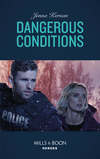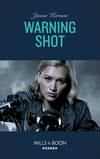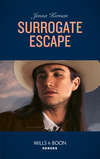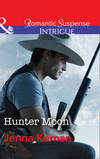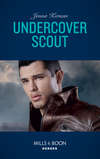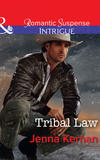Loe raamatut: «Shadow Wolf»
“Where are we going?”
“My place.”
She lifted her head and stared, eyes narrowing as if trying to decipher his intentions. Funny, to think of that sort of danger after all the other threats she had faced today.
“I’m not comfortable with that.”
“You don’t need to be comfortable. You need to be safe. I can make sure he doesn’t get to you.”
When she spoke, her voice seemed almost sedated, as out of focus as her gaze. “Maybe I could stay with a friend.”
“That would just put the friend in the crosshairs.”
She rubbed her arms and rocked back and forth.
“I can’t stay with you all night.”
“Lea, think for a minute. You need protection.
Nowhere else is safe.”
“I could go home.”
“To Salt River? He’ll follow.”
She slapped her hands on her thighs in frustration.
“You make him sound like an unstoppable robot or something.”
“Yeah. Exactly, but with one important difference.
I can kill him.”
Shadow Wolf
Jenna Kernan

JENNA KERNAN writes fast-paced romantic suspense, Western and paranormal romantic adventures. She has penned over two dozen novels, has received two RITA® Award nominations, and in 2010 won the Book Buyers Best Award for her debut paranormal romance. Jenna loves an adventure. Her hobbies include recreational gold-prospecting, scuba diving and gem-hunting. Follow Jenna on Twitter, @jennakernan, on Facebook or at www.jennakernan.com.
For Jim, always.
Contents
Cover
Introduction
Title Page
About the Author
Dedication
Chapter One
Chapter Two
Chapter Three
Chapter Four
Chapter Five
Chapter Six
Chapter Seven
Chapter Eight
Chapter Nine
Chapter Ten
Chapter Eleven
Chapter Twelve
Chapter Thirteen
Chapter Fourteen
Chapter Fifteen
Chapter Sixteen
Chapter Seventeen
Chapter Eighteen
Chapter Nineteen
Chapter Twenty
Chapter Twenty-One
Chapter Twenty-Two
Chapter Twenty-Three
Extract
Copyright
Chapter One
Kino Cosen wondered if this trail might be the one that would finally lead him to his father’s killer. Ten years he’d waited but he’d never been this close. Smugglers were dying, killed by the Viper. If he just had a little luck, he might finally be at the right place and at the right time.
He pulled the truck to the shoulder of the road on the lands of the Tohono O’odham Nation, which were just two miles from the Mexico border. Waves of heat undulated across the asphalt road as the June sun blazed down on the Sonoran Desert from a clear blue sky. His brother Clay opened the door of the SUV and the heat hit Kino like a furnace blast, eliminating all traces of AC in the time it took to take one single breath. He started sweating as he grabbed his rifle from the rack behind the seat. Clay took his from the opposite side.
Kino left the vehicle to investigate the solitary footprint where someone had stepped from the asphalt before returning to the impenetrable surface. This was the only visible sign of the smuggler’s passing. But farther up, he saw more tracks.
His brother slammed the passenger door shut and swore. “And this isn’t even the hot part of the year.”
“They crossed here,” said Kino, pointing to the narrow gap of open ground between two thorny bushes. His brother fingered a bent branch.
Clay, the better tracker, saw things that even Kino missed. He squatted to study the imprints upon the sandy ground.
“Carpet shoes,” he said and stood, returning his attention to the unrelenting sun. “If we were home I’d be tracking elk right now instead of men.”
“Not men. Man. Just one and these guys can lead me right to him. Then we can head home.”
“It won’t change anything,” said Clay.
“Family first,” said Kino, echoing his father’s favorite expression.
Clay made a sound through his teeth before backtracking to the vehicle to retrieve their water. When he returned, he handed Kino his bottle and they both clipped the plastic containers to their belts, leaving their hands free for the rifles. Kino also carried his service pistol, a semiautomatic, but Clay would not carry one. It was a difference between them. Kino was the law and Clay an ex-con. Not a felony, but since his release, his brother despised handguns. Their captain, Rick Rubio, had told Clay he could carry, but to no avail.
Prepared to track on foot, they stepped into the thorny brush, following the faint depressions left by the distinctive carpet-soled shoes that marked the trespassers as smugglers. Clay went first and then Kino.
“Another,” said Kino, pointing at the slight disruption of the unbroken sand. The indentation was small and circular, definitely a track.
“Good work, little brother,” said Clay, slapping him on the back, making his shirt and bulletproof vest stick to his shoulders. “How many?”
“Three?”
“Four,” he corrected, noting the different tracks visible to Clay, even though the group had walked in line and often in each other’s footsteps.
Walking was cumbersome because he and Clay wore full SWAT gear, as required even for them, and the standard equipment ringed their narrow hips. The water bottles knocked against their legs with each step, and the portable radios, ever ready, sat heavy on their left shoulders. Kino had left the satellite phone in the SUV. His semiautomatic was holstered around his waist and anchored to his thigh with a wide black strap. On their sleeves was the arrow-shaped tan patch that read Shadow Wolves. In the center was a fierce black wolf with one eagle feather tied to its fur.
Kino and Clay had taken one liberty with the uniform. Neither wore the regulation boots, preferring instead the lighter, higher moccasins that had been specially made for them by their grandmother. They were knee-high and sewn from soft buckskin. The lining was a paper-thin fabric that was totally snake-and thorn-proof. The rawhide soles were equally so. Kino’s moccasins had a thin vertical band of beads in a traditional pattern of arrows in red and white, while Clay’s sported beaded crosses of black and yellow. Anyone who knew the Apache would recognize the brothers’ people instantly by the distinctive tab at their toes. No other tribe wore moccasins quite like theirs.
Kino and Clay were Black Mountain Apache, used to winter snow and cool mountain air. But Kino had put in for a leave of absence to sign on for this mission. Only then had his older brother, who worked for the tribe’s cattle association, decided to come with him. As far as Kino knew, this was the first vacation Clay had taken in the six years since Clay’s release from juvenile detention—if you could call this a vacation.
They were on temporary assignment with Immigration and Customs Enforcement. ICE’s mission was to apprehend smugglers and traffickers along the borders that included the stretch that ran straight through the Sonoran Desert and the Tohono O’odham reservation. Because the Americans had missed things, ICE had formed the only special unit composed exclusively of Native Americans. Sanctioned through the US Department of Homeland Security, the Shadow Wolves were members of an elite drug-tracking force. The unit was composed of the best trackers to be found anywhere.
Their mission was to cut for sign—to look for footprints, spot broken vegetation or tire tracks that might indicate evidence of the traffic that washed drugs into the US from Mexico. That was their official mission but Kino wanted one particular smuggler, the one known as the Viper.
The Shadow Wolves were here on sacred land by special invitation of the Tohono O’odham people. And though they worked closely with the US Border Patrol, they did not answer to them. Border patrol secured borders from illegal entry or illegal products. ICE handled enforcement and removal operations. The Shadow Wolves, numbering only sixteen, were here to see what the Americans could not and to find the ones who were slipping by under their noses.
Kino followed the tracks, his brother trailing behind, both staying well clear of the slight indentures.
“Getting close to the rez,” said Clay.
Kino glanced up to take in his surroundings. The land didn’t look any different. Saguaro cactus rose above the ground; sage, barrel cactus, rock and sand stretched for miles. But this land was different because this side of the road belonged to the Tohono O’odham Nation of Arizona. Sacred land. Indian land.
Kino continued on the trail.
“The border patrol captain requested notice of our location if we enter the rez,” said Clay.
“Lucky we don’t report to him,” said Kino.
It was true. They worked directly under Captain Rick Rubio, an Apache who reported to the field operations supervisor for ICE. Still, if they found illegals, it was US Border Patrol that would be called to detain and deport them.
“Should we call Rubio? He can call Barrow.”
Gus Barrow was the pain-in-the-neck overachiever, control-freak captain out of Cardon Station whom Kino avoided when possible.
“I left the phone in the truck,” Kino told him.
“I can radio Rubio. He can call BP,” said Clay.
“Wait a bit. The O’odham are damned sick of border patrol. You heard the council leader. What’s his name?”
“Sam Mangan,” said Clay.
“Yeah,” said Kino. “He welcomed us personally. Invited the Shadow Wolves onto the rez. They’ve got no beef with us.”
Clay gave a lopsided grin. “Because we’re not the ones stopping them every time they want to visit their families in Mexico.”
“Exactly. So leave BP out. We might not need them.” Kino pointed to a track. “They’re fresh. These guys are close.”
“I know that. That’s why I want to call in. Captain Rubio said that Barrow wants notice when we cross onto Indian land.” Clay snorted and stopped tracking. “You used to be more fun.”
Kino paused and pointed at the tracks. “I’m not giving a white man notice that I’m on Indian land. We got permission from Mangan and we answer to Rubio, not BP.”
“Fine.”
Kino ignored the ire behind the single word Clay spit at him and continued following the tracks.
Clay blocked his path.
“Why do you always do this?”
“Do what?”
“Captain says to coordinate with border patrol, you don’t. They say to go left, you go right. Clyne and Gabe tell you to stay home, you come here. They’re shorthanded as it is. It was a rattlesnake rattle they found. Anyone can get them.”
“But not everyone leaves them inside dead bodies.”
And, yes, his brother Gabe wanted him home in his absence. And, yes, as a Shadow Wolf, it was his job to find smugglers. But, really, he didn’t want them. He wanted the one who was killing them.
“Family first,” said Kino again.
“Your family is at Black Mountain and up there in South Dakota. That’s where we should be.”
“I’ve got business here.”
Because word had reached him that they were finding Mexican smugglers with rattlesnake rattles shoved into the bullet holes in their dead bodies. He’d read the reports. Sometimes the rattles were in the victim’s cheek, or the shoulder, the breast or in the belly, right next to the navel. But always, the rattle was there, just like the one they found ten years ago in the body of Kino’s father. And Clay knew exactly how Kino had known it was there.
Clay rubbed the back of his neck.
“You gonna help me or what?” asked Kino.
“I should be helping Gabe and Clyne. They’re going to the powwow without me.”
“This is more important.”
Clay gave him a look that told him he disagreed. “Grandma wants us there.”
Kino waved his arms. “Why’d you come, then?”
“Not to chase a ghost.”
“The Viper isn’t dead.”
“I wasn’t talking about him.”
Did he mean their dad, then? Was Clay so willing to let his father’s murderer go unpunished? Kino wiped the sweat from his forehead.
“Look. He’s here. I can feel it.”
Clay sighed and swept his hand forward so Kino could continue along the trail.
They traveled nearly a mile and were climbing a ridge when Clay slowed Kino with a touch.
“Stay down.” Clay motioned to the rocky ridge. “Don’t give them your silhouette.”
Kino nodded, lowering his profile as they neared the top. The prints were fresh. Their quarry was close.
That was when they heard the distinctive pop of four rifle shots. Both men exchanged a glance, hunched down and ran in the direction of danger.
They crested the small incline and fell in unison to the ground. There, below them, was a red pickup truck. Four men lay motionless on the ground. Another man stood over them, a rifle relaxed in his left hand.
Looked like four Mexicans from appearances and, given their parallel positions, Kino guessed they’d been kneeling then shot execution style. The ethnicity of the one still standing was questionable.
Clay lifted his rifle and took aim.
Kino placed a hand on Clay’s shoulder. He knew his brother was an excellent shot. Not as good as Kino, but excellent.
“Wait,” whispered Kino. He was already certain, but he wanted to see the man do it and then he wanted that shot himself.
Clay took his finger from the trigger but continued to watch through the scope.
Kino did the same.
“I can’t see his face,” whispered Clay.
“Damned cowboy hat,” replied Kino.
The man was slim, broad-shouldered, obviously fit, and spitting tobacco as he went methodically from one body to the next, checking each with the toe of his boot.
None of the Mexicans moved.
“Rancher?” asked Clay.
“Don’t think so. Too light for an Indian. Why is he on Indian land?”
Clay shrugged. “Not border patrol. No gear.”
The man wore a white work shirt and jeans cinched at the waist with a worn leather belt that held a knife housed in a black nylon sheath. He also had a pistol holstered to his hip. On his head rested a straw, sweat-stained hat. His truck was old, faded red in color and rusted at the wheel wells. There was a gun rack behind the seat.
The shooter held his rifle in a casual grip. Right-handed, Kino noted. He stooped and recovered four camo-colored backpacks one at a time and casually tossed them into the truck bed. Kino recognized the backpacks as the type often favored by Mexican drug smugglers.
The man tucked the rifle under his arm and reached into his front breast pocket, withdrawing what appeared to be a can of chewing tobacco. The man turned his back as he handled the container. Then he used one hand to retrieve his knife.
“What’s he doing?” whispered Clay.
“Not sure.” But Kino had a feeling. Hope bubbled in his throat and his body tingled all over. Was this his man?
Clay settled against the earth, getting comfortable.
The cowboy squatted and flipped the nearest smuggler onto his back. He set aside his rifle and used his knife to slice open the camo shirt covering the body.
“Looking for drugs?” asked Clay.
The guy could be raiding the smugglers. There was certainly a living to be made stealing from men carrying drugs. But it was a dangerous game, robbing from the cartels.
The cowboy now had exposed the chest of one of the dead men. Kino could see the bullet wound oozing dark blood.
The man lifted something from the container and shoved it into the bullet hole.
“What was that?” asked Clay.
“It’s him,” said Kino, raising his rifle to take aim just as a cloud of dust rose up to obscure his view. “What the hell?” He opened his other eye to see a blue pickup rattle into view.
“More company,” said Clay.
Kino took his eye from his scope because it now showed only billowing dust and noted the position of the dead men and the arriving truck. Was it possible that the driver of the blue pickup might not see the cowboy or the dead bodies strewed on the thirsty ground? Or was this the shooter’s contact?
As the dust billowed, Kino returned his scope to his target. Waited.
“Tell me what you see,” he said to Clay as he searched for his shot. Clay was ten feet to his left and had a different perspective. Plus, by not using his scope, Clay could see the entire picture.
“Looks like a woman. She’s waving, pulling parallel. Maybe Native. She’s got water barrels in her truck bed. He’s stepping out to greet her. Waving, too.”
“Contact,” he whispered. Two birds, one bullet, he thought.
Kino could see his target already rounding the front of the newly arrived pickup, rifle in hand. He fingered the trigger just as the man stepped behind the cover of the cab.
Kino muttered a curse. “No shot.”
“Might be together,” said Clay. “Or she’s part of the aid organization filling the water stations.”
“They aren’t supposed to be on Indian land, either,” said Kino.
“Tell her,” replied Clay. “Anyway, if she’s unexpected company, he’ll kill her for sure.”
Kino needed to take the shot but he couldn’t see his target. All he could see across the bed of the red pickup was the passenger door of the blue truck, scratched and dusty, window open. On the opposite side of the seat he saw a woman’s figure, the driver, sitting behind the wheel, visible from shoulder to waist through the open passenger window. Shapely, her dark hair was braided in one long plait that hung over her right shoulder. She wore a pale blue T-shirt that hugged her breasts and slim torso. Her face was obscured by the roof of the cab, but her hands were slim, cinnamon brown and bedecked with a silver-and-turquoise ring and wide-cuff bracelet, both Zuni, from the style.
“He’s lifting his rifle,” said Clay.
The woman’s hands extended and left the steering wheel.
“I’ve got no shot,” Kino repeated, his accelerating heart rate now interfering with his aim. All he could see was the man’s elbow and the barrel of the rifle.
“He’s going to shoot her,” said Clay, his voice holding a rare note of alarm.
Kino did the only thing he could think of. He took out her windshield. Glass exploded and his target vanished on the far side of the truck. The woman threw herself across the seat, hands over her head.
Kino shot out the rearview mirror and then the driver’s-side mirror for good measure.
“Where is he?” said Kino, scanning the area.
“No sign,” said Clay.
A moment later the red pickup began to roll.
“Must have gone under the truck,” said Clay, taking a shot at the red truck.
Kino had no target, but he now knew where the guy was. He started shooting, trying for a lucky hit through the cab of the truck. From beside him, Clay began shooting.
They punctured several holes before the pickup turned to drive away. Kino took out the back window but the gun rack remained in place. The driver never lifted his head.
“Driving blind,” said Clay.
And doing a darn good job, thought Kino. He’d managed to get to the road, which was lined with scrub cactus and thick with sage.
“Getting away,” said Clay.
“Try for the tires.”
Kino had one glimpse of the back of the man’s head as he popped up behind the wheel and steered onto the road. The truck veered as Kino fired and missed.
“That was some move,” said Clay.
Kino calculated the time it would take to get back to their SUV and pursue. Too long, he realized. The guy would be on the highway before they backtracked.
Kino watched the plume of dust from the truck he could no longer see. Then he directed his gaze at the blue pickup. Ten years and he finally had him, only to have this imbecile drive right into the middle of his shot.
“Call it in,” he said to Clay as he bounded down the steep incline to see about this woman, the one with the terrible timing.
Tasuta katkend on lõppenud.











